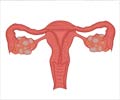Q: Which doctor should I consult if I have menstrual problems associated with abdominal pain?
A: You need to consult a gynecologist. You may be having an ovarian cyst and need work-up.
Q: I have an ovarian cyst. Is it dangerous?
A: Unlikely. Most ovarian cysts are harmless and go away on their own. Benign cysts will need to undergo periodic check-ups and pelvic ultrasound to monitor the cyst.
Surgery may be necessary only if the cyst becomes symptomatic, undergoes certain changes or if you are at risk for cancer (positive family history among first-degree relatives). Also if you are over 45 years and your periods have stopped it is best for the ovaries to be removed.
Q: Is it possible for an ovarian cyst to bleed?
A: Yes. A blood filled cyst such as an endometrioma may rupture with hemorrhage into the abdominal cavity. This condition needs prompt management.
Q: How big is the normal ovary?
A: The normal ovary is 4 cm x 3 cm x 2 cm in dimension. They are oval shaped structures. They become much smaller and atrophic after menopause.
Q: What is the chance that an ovarian cyst may become cancerous?
A: Very less. Most ovarian cysts are benign and harmless. The risk of cancer is slightly more in the post-menopausal age group.
Q: Do ovarian cysts affect the chances of becoming pregnant?
A: The functional type of cysts, namely the follicular or the corpus luteal cysts do not affect fertility. Cysts that occur in endometriosis, polycystic ovarian disease may affect fertility. However you need to consult your doctor and discuss treatment options to improve your chances of becoming pregnant.










